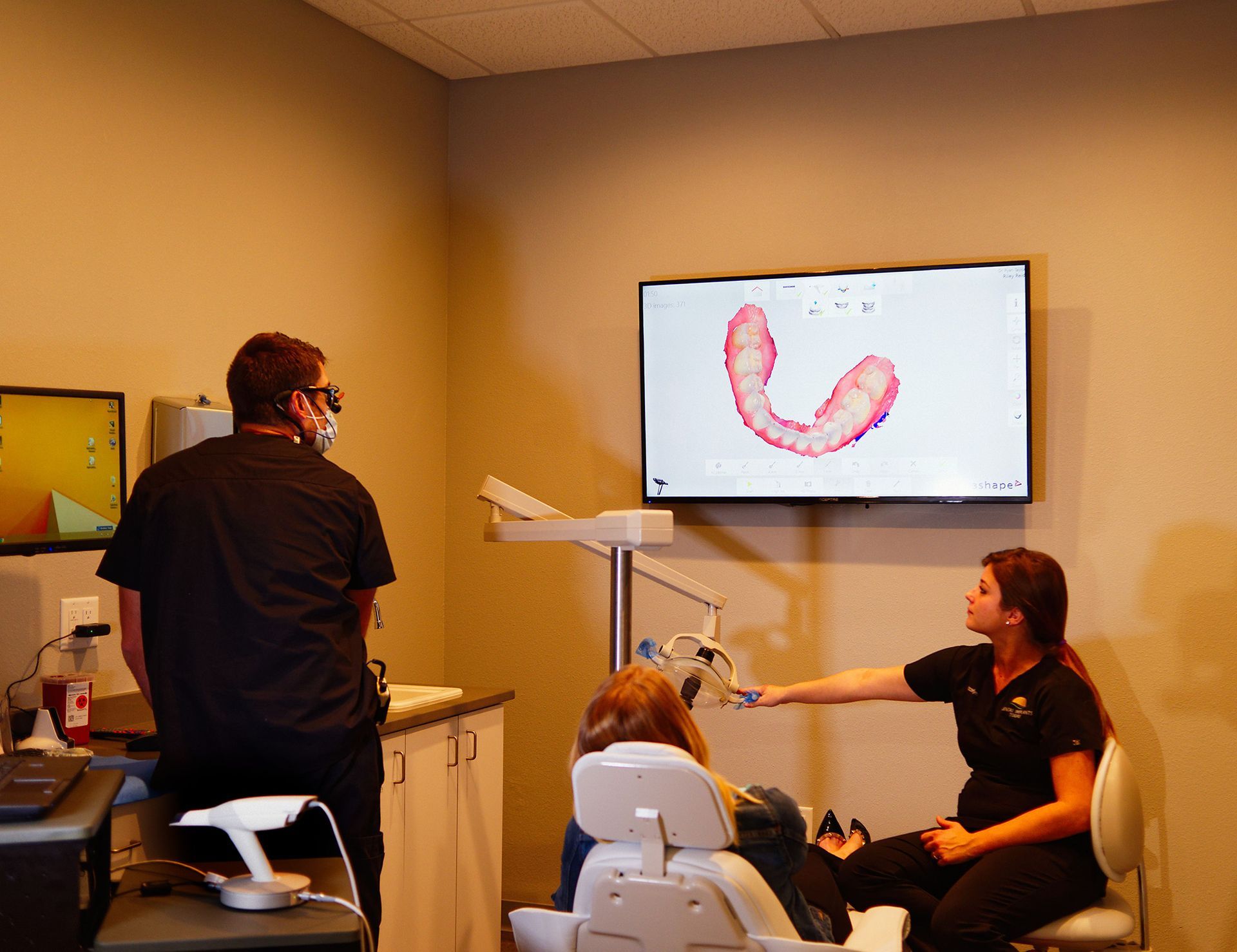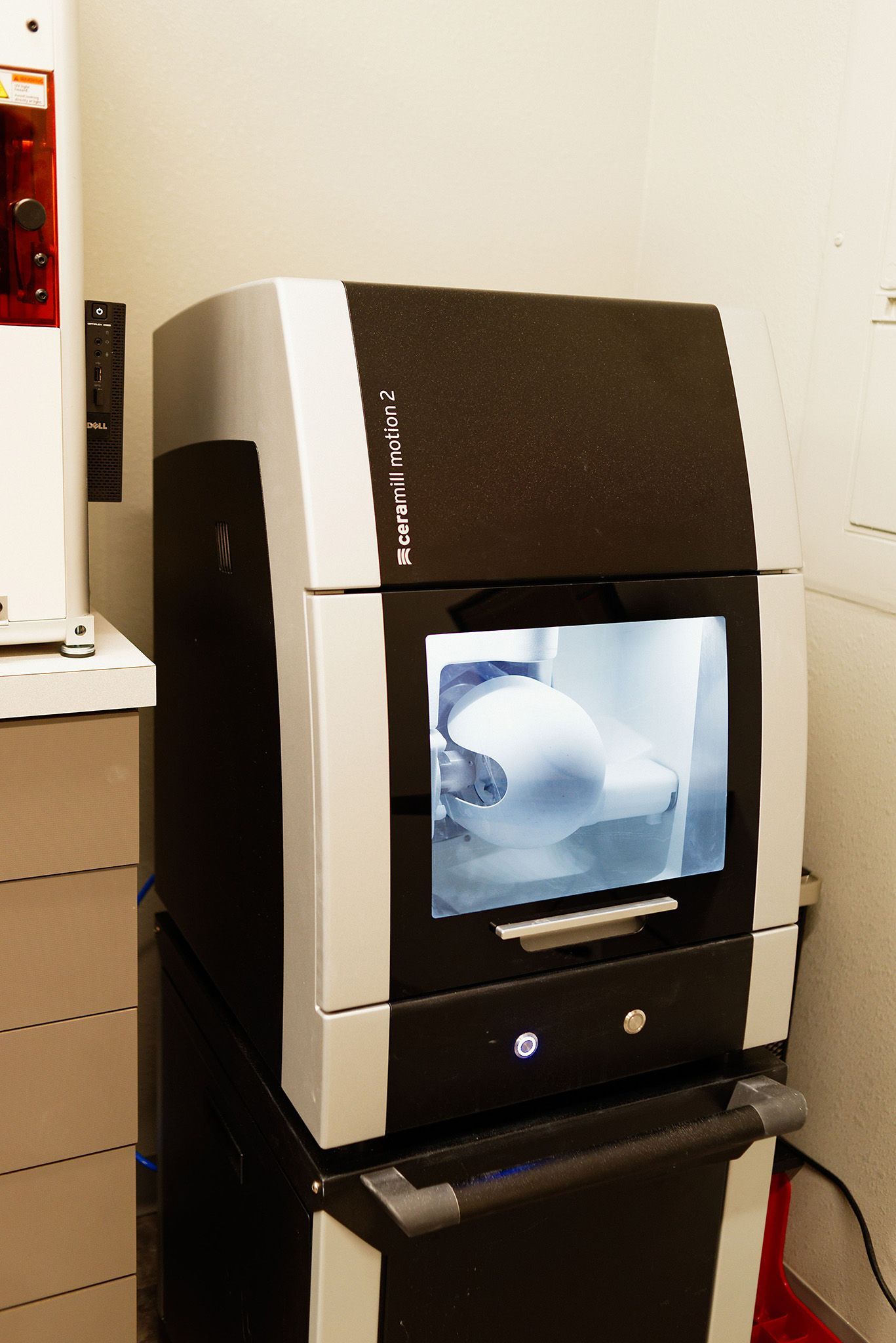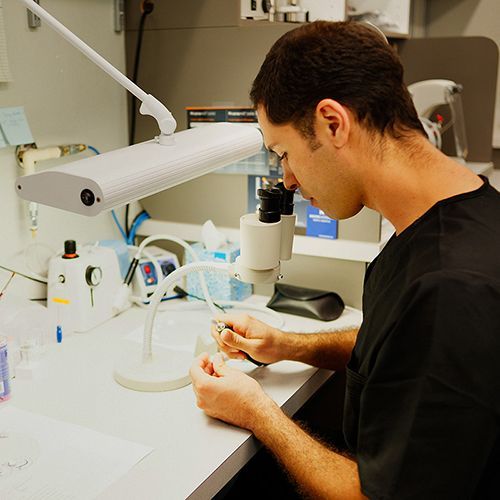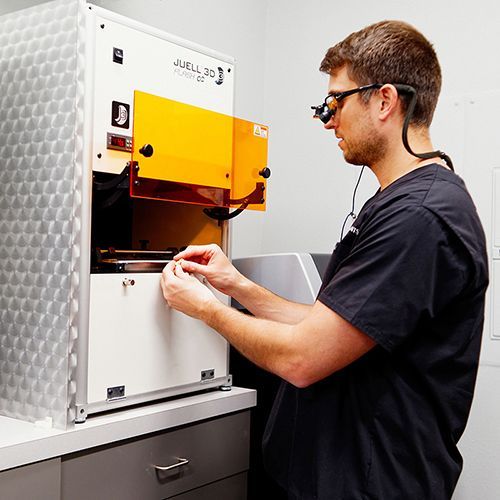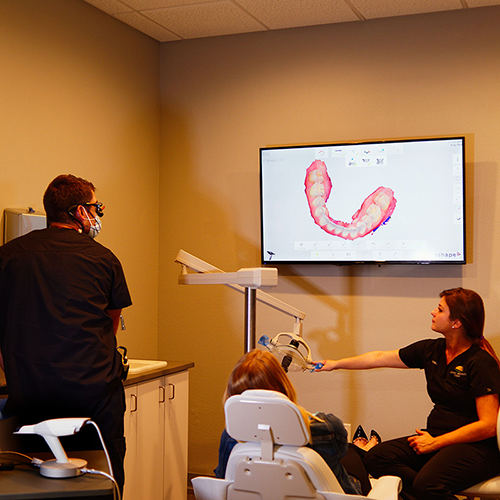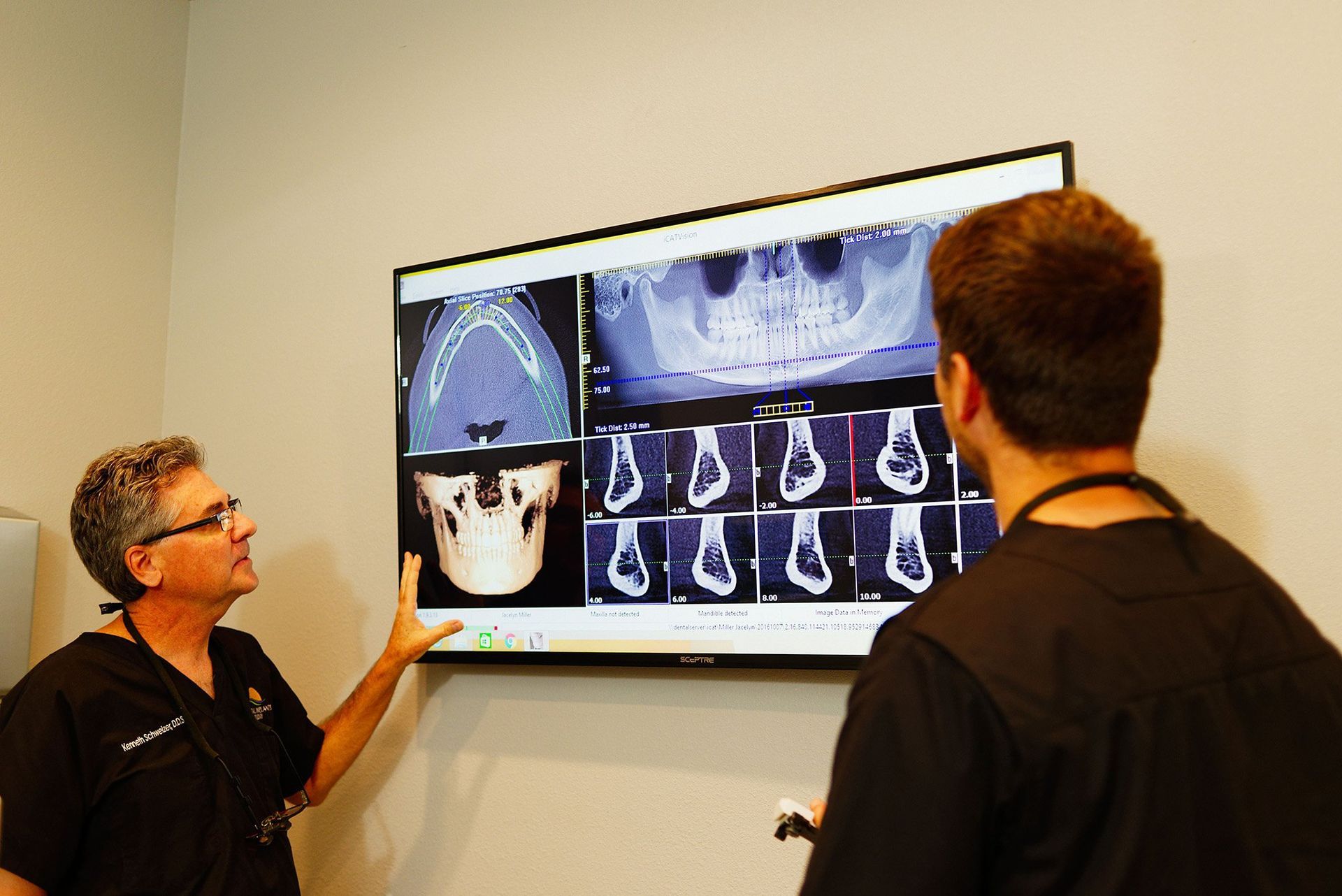Dental Implants in Orlando, FL
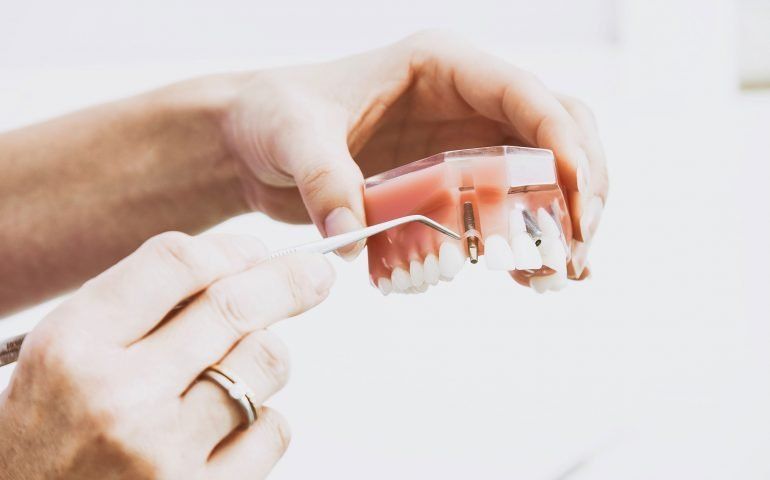
Dental Implants
Do you have one or more empty sockets in your mouth? Perhaps you lost a few teeth to decay, an accident, or extractions – but it is now time to get them replaced. You see, there are a number of complications associated with not replacing missing teeth in the upper and lower arches, in a timely manner. Not only does this affect the aesthetics of your smile, but it also sets in motion a chain of unfavorable, unwanted changes to the teeth, bone and soft tissues of your mouth.
There are a number of treatments that can help you restore dental aesthetics and functionality following tooth loss, but the best options currently is Dental Implants. A dental implant is like an artificial tooth that offers countless merits and advantages as compared to other treatments like bridges and dentures. Stronger, and even more resilient that our own natural teeth, these implants are now the top choice of surgeons and general dentists at leading practices around the globe.
If you’ve been experiencing problems related to jaw weakening, food impaction and even a less-than-perfect smile because of empty spaces in your mouth – implant surgery is probably the best treatment for you. At Strategic Dental Care, we take immense pride in giving our patients new reasons to smile bigger, and better than ever before. We use research-based techniques, and the finest implant systems available today to give you more than just a beautiful smile every time.
What exactly are dental implants and how can they help?
When you look at a dental implant, you’ll see that it resembles a screw, fitted with an artificial dental crown on top. The screw-like portion is basically the implant and it is usually fabricated using a strong metal like Titanium. The crown is made to perfectly match the shade and contours of the natural teeth, and is usually fabricated using porcelain or Zirconia.
Unlike bridges and dentures, implants actually replace the whole missing tooth – from top to bottom, i.e. the crown as well as the root. The screw-like portion is first surgically embedded into the jaw bone to give this artificial tooth a strong, immovable foundation. It is then allowed to fuse with the cell of the surrounding bone for a period of at least three month. This process is known as Osseo-integration – and is critical for the success of the treatment. When the implant has adequately integrated with the bone, it is fitted with the custom-fabricated crown, which is the last phase of the treatment.
The implant surgery is an invasive one, and anesthesia is administered before the procedure begins. It can help patients who have a single missing tooth in their mouth, several missing teeth – and even patients who do not have any teeth left in their mouth (via implant retained dentures).
on like natural teeth.
How are implants different from other teeth replacement treatments?
Perhaps the only thing common between dentures, bridges and implants is that they are all meant to replace missing natural teeth. For everything else, implant surgery is the more superior treatment, and offer more benefits than the rest. Here are a few ways in which the treatment differs from other methods of tooth replacement in dentistry today:
- Bridges and dentures only replace the top portion (Crown) of the missing teeth. Implants replace both, the crown as well as the root.
- In terms of fabrication quality, implants are made using high-strength, high-resilience materials that are not prone to damage or fracture, and can fully sustain the forces inside the mouth. Bridges and dentures are often prone to damage and may require replacement after a few years.
- Implants contribute to the strengthening of the jaw bone by fusing with its cells. Prolonged use of bridges and dentures can actually lead to the deterioration of the bone, leading to jaw bone thinning and weakening.
- Implants can prevent early signs of aging such as skin sagging and wrinkles, which can otherwise result from jaw bone thinning.
- Bridges require re-sizing of adjacent natural teeth for ideal positioning and cementation, whereas dentures rely on adhesives and metal clips for stability. Dental implants do not require either – and are quite strong on their own.
- Dental implants offer better smile aesthetics, and can give patients a complete cosmetic and functional smile makeover.
- Dental implant surgery costs more than bridges and dentures – but prevents many complications in the long run.
- Dental implant surgery is more invasive in nature, as compared to bridges and dentures.
What are the advantages of opting for dental implants over other treatments?
There are probably countless benefits associated with choosing implant surgery over other treatments for missing teeth replacement – but we’ll try to enlist the most prominent ones for you:
- Implants are said to be stronger than your actual natural teeth and will last you a whole lifetime without requiring any replacement or repairs.
- They look and feel exactly like natural teeth in the mouth.
- You can clean and maintain implants just the way you would your natural teeth – they do not require any extra care.
- No risk of implants coming loose or displacing in the mouth when you are speaking, smiling or chewing your food.
- No dietary restrictions – implants are strong enough to withstand even the strongest intra-oral forces, which means that you can continue to enjoy all the food that you love without the risk of implant fracture.
- Implants strengthen the jaw bone into which they are embedded, thus effectively preventing it from degenerating over time. They halt and reverse the process of bone thinning and weakening which results from having empty dental sockets in the mouth.
- Implants can keep early signs of ageing at bay. It is a well-established fact that a thinner jaw bone and missing teeth cause the facial skin to sag. This can make you appear older than you actually are. With implants in place, you can restore the element of youth to your skin and facial contour.
- If you do not have any teeth present in your mouth – you can opt for a treatment known as Implant Retained Dentures. The All-On-4 and All-On-6 technique associated with this treatment is used to hold a complete denture in the mouth with the help of several strategically positioned and placed dental implants. This ensures outstanding support, stability and strength of the denture, along with complete restoration of dental/speech functionality as well as smile aesthetics.
What happens during an implant surgery and how long does it take?
It may take a couple of months for an implant surgery to be completed – but it is all worth the wait. You may have to visit the office at least 4 times. During your first appointment, we’ll perform a thorough evaluation of your mouth and take radiographs/3D oral images which will be used for treatment planning. During this visit, we will also address any queries or concerns you may have regarding the treatment.
During your second appointment, you will first receive a dose of local anesthesia at the site of surgery to eliminate any chances of discomfort, sensitivity or pain. Once the area has been numbed successfully, the implant is surgically fitted into the jaw bone through a small incision. This incision is then closed with the help of a few stitches. You may be prescribed painkillers and antibiotics, towards the end of the appointment.
You may require an extra visit if we find that you do not have an adequate amount of bone at the site of implant surgery, in which case a Grafting procedure may be performed as a prerequisite.
Dental grafting for implants refers to the placement of natural or donor bone graft at the site of implant surgery to stimulate bone growth. A strong bone provides better support to the implant, ensuring that it remains stable in place without the risk of dislodgement. A radiograph can help determine whether or not you’ll need grafting before the actual implant surgery.
Once the implant has been embedded into the bone, it is allowed to fuse with the surrounding cells for at least three months. A radiograph will then be taken once again to check if the implant has fused with the bone. In most cases, this period of time is enough for the implant to gain the stability and strong foundation that it needs. As the final phase of the treatment, a porcelain/zirconia crown is fitted on top of this implant.
How can dental implants be maintained and cleaned?
Dental implants do not require any special cleaning or maintenance. You daily at-home oral hygiene routine will suffice, whereby you’ll ideally be brushing your teeth at least twice a day, and most importantly before bedtime, and you will also be flossing regularly. Make sure that you keep your gums healthy and clean to prevent gingivitis and Periodontitis, both of which can have adverse effects on the stability of your implants, as well as natural teeth.
At Strategic Dental Care, we advise all our patients who have empty dental sockets in their mouths, to consider implant surgery. Implants can reshape the way you smile, speak and even eat your food. If you’ve been wearing dentures for too long, and are tired of dealing with dietary restrictions, frequent usage of adhesives, and the constant fear of denture displacement in the mouth – implants are the best solution for you. You’ll be able to eat what you like, you’ll look younger, and you’ll never have to worry about keeping your artificial teeth in place ever again.
You must have heard that implants are expensive, but we believe that they’re an investment for your smile, not a financial burden. With their advantages outweighing drawbacks, if any, dental implants are the best replacement for your natural teeth today.
If you wish to learn more about dental implants, the procedure, their benefits, and how the surgery can help you regain complete dental function – feel free to give us a call or visit us at Strategic Dental Care. Our team of professionals will always be more than happy to address any questions you may have!
Contact Us
Contact the team at Strategic Dental Care today at tel:407.284.1645 to schedule a consultation and begin your smile makeover!
Gallery
What Our Patients Says About Us?
“The staff is so personable at Strategic Dental Care. The doctors are all wonderful and truly care about the patients. The assistants make you truly comfortable while your in the dental chair. The office is high tech and all digital. The office is conveniently located off Strategy Blvd. and easy to locate. Can’t wait for my next visit!”
– Melissa K.
“Incredibly friendly staff at Strategic Dental Care. The office was loaded with new equipment and everything was extremely clean. Every effort was made by the dentist and staff to make me feel comfortable. All treatments were explained before they were started which made me feel good about what they were doing. I’ve already recommended Strategic to a number of my friends.”
– Jason R.
“The five star treatment begins the moment you hit the door. The receptionist was prompt, warm and professional. The hygienist was detailed and attended to my every possible comfort including my flat screen tv and massaging chair. My teeth was gone through a lot because of Sjogren’s and the dentist gave me my smile back in just one visit! I love this place! Come here and you will be treated like a rock star.”
– Camille
Common Questions
See some common questions and answers below, or call us at 407-284-1645
What does the implant process involve?
The journey begins with a consultation and imaging (like digital X-rays or Panorex), followed by surgically inserting the implant. After healing (called osseointegration), a prosthetic tooth—like a crown—is attached. This multi-phase process ensures the implant is stable and functional.
How long does it take before I get my new tooth?
While timelines vary, the typical process stretches over several months—from the initial procedure to the placement of the final restoration—allowing for proper healing and implant integration.
What aftercare should I expect following implant surgery?
Early recovery may include mild bleeding and discomfort for about 2–3 days. Follow post-operative care instructions closely, like avoiding chewing near the implant site. Use NSAIDs (e.g., ibuprofen) or acetaminophen as needed for pain. Contact the clinic if symptoms persist beyond a few days.
Why choose implants over other restorative options?
Implants provide the most natural-feeling and -looking solution. Unlike bridges, they don't require alteration of adjacent healthy teeth. They also help prevent bone loss and maintain better oral alignment over time.
Who is a good candidate for dental implants?
Ideal candidates have adequate jawbone and are in good overall health. Certain conditions—like uncontrolled diabetes, smoking habits, or compromised healing—may affect suitability or require additional preparation.



